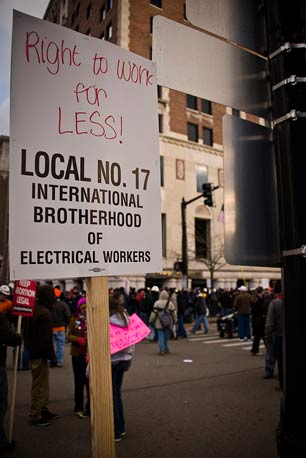The lawsuit now before the Michigan Supreme Court is technically about whether the state’s 2012 right-to-work law applies to public employees, but it is really about the place of workers in American democracy.
Back in 2013, a Michigan Court of Appeals ruled that state employees are covered under the law. State employees appealed that ruling and argued their case before the state Supreme Court two weeks ago (January, 2015). Public sector unions say that they are exempt from the law because the state constitution gives the Michigan Civil Service Commission oversight of state workers. The state Attorney General’s office argues that although the commission oversees working conditions, such oversight does not require that employees be in a union.
All of this is beside the point: The right-to-work law promises to protect the worker’s individual rights while undermining workers’ collective power. It is a classic bait-and-switch.
The law encourages workers to accept the higher wages and benefits that their unions negotiate, while not contributing financially to house or staff the organization, advertise its objectives or mobilize the membership behind a common list of demands.
It also dulls the urgency of collective action. If workers are unwilling to contribute dues, they are unlikely to put themselves out in other ways: They might choose not to sign a public petition, attend a rally or walk a picket line. Simply put, the right-to-work incentivizes individual workers to opt out of the most effective strategies for winning or holding onto a living wage.
At the same time, conservative politicians hail the resulting power imbalance between labor and management as a victory for individual freedom. For example, in 2012, Michigan governor Rick Snyder said that the law was “about being pro-worker, about giving the freedom to choose who they associate with.”
State Senate majority leader Randy Richardville echoed the governor, saying, “It should be the worker’s freedom to choose whether or not he or she belongs to a union. . . what this ultimately comes down to is the individual worker.”
Now one might say that Snyder and Richardville were just listening to the complaints of workers who hated paying union dues. But if conservative lawmakers had wanted the input of workers in 2012, they could have walked outside the state capitol in Lansing to see the thousands of workers who were pleading with them to defeat the right-to-work bill. Instead, they hustled the bill past the Senate, House, and governor in one day of a lame-duck legislative session.
If they weren’t talking to workers, to whom were they talking? Well, Charlie Owens, who was then state director of the National Federation of Independent Business, said that Michiganders would remember “this historic vote . . . establishing a worker’s freedom to choose whether or not they want to belong to a union.” That sounds eerily familiar. (Lansing State Journal, “Reactions to Passage of Right-to-Work Legislation,” December 12, 2012).
Let’s not pretend that the Michigan Supreme Court is deciding whether or not the right-to-work law applies to public employees. The court is deciding on what it means to say that American workers are free.
4 Days Left: All gifts to Truthout now matched!
From now until the end of the year, all donations to Truthout will be matched dollar for dollar up to $44,000! Thanks to a generous supporter, your one-time gift today will be matched immediately. As well, your monthly donation will be matched for the whole first year, doubling your impact.
We have just 4 days left to raise $44,000 and receive the full match.
This matching gift comes at a critical time. As Trump attempts to silence dissenting voices and oppositional nonprofits, reader support is our best defense against the right-wing agenda.
Help Truthout confront Trump’s fascism in 2026, and have your donation matched now!
